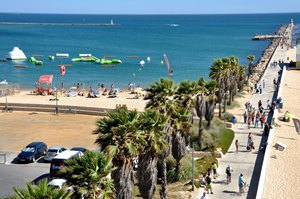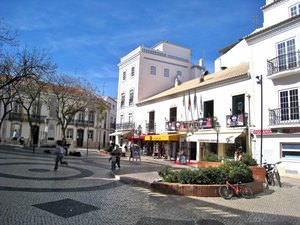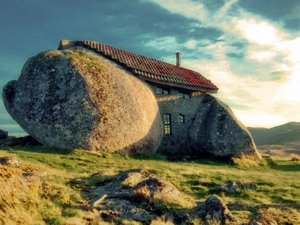
The modern economy of Portugal may well be called highly developed, although all the other countries of the European Union in recent years are afraid of serious reforms that are being conducted in this country. Today, there are only 2 critical problems in Portugal. The first problem is the existence of a huge number of privatized enterprises, and the second is the low level of education. To date, the predominant industries in Portugal are the production of clothing and footwear, the manufacture of pulp and wood products, as well as the processing of metals, petroleum products, and chemicals. The main assets of industrial plants operate in the southern regions. Here you can find steel, chemical-technologies, food, oil refining, and even automobile factories.
Portugal is clearly divided into the northern wooded and southern plains parts. The south of the country is characterized in its appearance by the …
Read further
In the northern regions, the consumer goods industry is developed. Portugal is rich in various ores. To date, the deposits of chromium, tungsten, uranium and tin are actively being developed. These metals are mostly exported. Portugal continues to actively develop agriculture. The main crop here is wheat. It is being cultivated in the south. Corn, barley, oats, rye, beans, and rice are grown in the north. The greatest food demand in the modern market of Portugal is for potatoes, so it is grown throughout Portugal.
In the river valleys, as well as in the Algarve region, there are excellent vineyards, thanks to which winemaking has been actively developed. Currently, Portugal is one of the main countries in Europe, which exports wine throughout the world. Muscat wines, port wine, as well as various sorts of dessert rose wines are the most popular exports. Due to the territorial location of Portugal, fishery is developed here too. In the coastal waters, there are anchovies, sardines, tuna and cod. Statistics show that one third of the country is covered by forests. This gives the woodworking industry an opportunity to actively flourish. The most valuable in Portugal is cork oak and pine, from which products are manufactured and exported to various countries around the world. However, the pulp industry is based on imported product. For the production of paper, eucalyptus is imported from Australia. Copyright www.orangesmile.com
The Mediterranean climate is dominant in Portugal. The ocean has a huge influence on its formation. Air masses coming from the ocean make the …
Read further
Tourism is an important activity in Portugal. Every year, more and more travelers come to the country. Consequently, high-class hotels and hostels are being built, and the service sector is developing. The transport system in the country is poorly developed. Today, there are only 35,000 kilometers of railways in the country, of which about 1,000 are electrified. The length of highways with a hard surface is about 60,000 kilometers. Sea transport is mostly used for transportation to the mainland from the island. However, the tonnage of the marine fleet does not exceed 1.2 million tons.
![Lagos Lagos]()
The majority of the revenue in Portugal comes from trade. The main products that go abroad are clothes, as well as ready-made textiles, wine, woodworking products, timber, ships and electrical equipment. The main import items are the initial raw materials for the operation of the industrial and food sectors. The main trade partners are France, Great Britain, and Germany. In 1991, Portugal became the poorest country among the European Union. However, significant investments made it possible to revive the country’s economy.
The transport infrastructure of Portugal is at a decent level. Most of the transport companies in the country are private owned. Due to constant …
Read further
In terms of fuel and energy index in Portugal, there are no problems. The average consumption of primary energy resources is about 30 million tons of oil equivalents. A large energy input is made by hydroelectric power stations. According to data of last year, the country produces more than 47 billion kilowatts per hour. Today, the standard of living in Portugal allows it to occupy a worthy 23rd place in the world ranking. Despite this, the wages here on average, are lower than in other countries of the European Union; about 650 Euros. The GDP growth is 2.6%, while the private incomes of citizens have grown by about 1.5%. Unemployment in the country is one of the lowest among the countries of the European Union and is about 4%. Inflation according to last year’s data is 3.6%. The largest contribution to the GDP of the country is income from the services sector; more than 66%. About 30% comes from industry and about 3% from agriculture.
 The modern economy of Portugal may well be called highly developed, although all the other countries of the European Union in recent years are afraid of serious reforms that are being conducted in this country. Today, there are only 2 critical problems in Portugal. The first problem is the existence of a huge number of privatized enterprises, and the second is the low level of education. To date, the predominant industries in Portugal are the production of clothing and footwear, the manufacture of pulp and wood products, as well as the processing of metals, petroleum products, and chemicals. The main assets of industrial plants operate in the southern regions. Here you can find steel, chemical-technologies, food, oil refining, and even automobile factories.
The modern economy of Portugal may well be called highly developed, although all the other countries of the European Union in recent years are afraid of serious reforms that are being conducted in this country. Today, there are only 2 critical problems in Portugal. The first problem is the existence of a huge number of privatized enterprises, and the second is the low level of education. To date, the predominant industries in Portugal are the production of clothing and footwear, the manufacture of pulp and wood products, as well as the processing of metals, petroleum products, and chemicals. The main assets of industrial plants operate in the southern regions. Here you can find steel, chemical-technologies, food, oil refining, and even automobile factories.
 The majority of the revenue in Portugal comes from trade. The main products that go abroad are clothes, as well as ready-made textiles, wine, woodworking products, timber, ships and electrical equipment. The main import items are the initial raw materials for the operation of the industrial and food sectors. The main trade partners are France, Great Britain, and Germany. In 1991, Portugal became the poorest country among the European Union. However, significant investments made it possible to revive the country’s economy.
The majority of the revenue in Portugal comes from trade. The main products that go abroad are clothes, as well as ready-made textiles, wine, woodworking products, timber, ships and electrical equipment. The main import items are the initial raw materials for the operation of the industrial and food sectors. The main trade partners are France, Great Britain, and Germany. In 1991, Portugal became the poorest country among the European Union. However, significant investments made it possible to revive the country’s economy.



